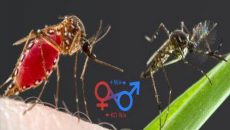Why Scientists and Google Launch A High-Tech War To Combat Zika
Raised by robots to carry bacteria, the bugs will decimate disease-carrying mosquitoes in California. Biotech experts are trialing this biological warfare in an effort to prevent the spread of mosquito-borne diseases like yellow fever, malaria, dengue, Zika that cause 800,000 human deaths a year.
Three times a week, on a quiet block of Stock Island on the Florida Keys, 25,000 of the world’s deadliest creatures are released into the wild.
And if they do their jobs, these male mosquitoes will contribute to a significant suppression of the female bugs that do bite and, more importantly, spread disease.
“This is a very robust mosquito that is causing diseases that are very impactful on people’s lives,” said Andrea Leal, executive director of the Florida Keys Mosquito Control District. “Aedes aegypti is the most difficult mosquito to control.”
The Aedes aegypti mosquito is responsible for spreading diseases like dengue fever, chikungunya, yellow fever, and, most recently, Zika. It’s not the deadliest of all the mosquitoes that title goes to the species that carry malaria but it’s causing the most grief in the United States.
One mosquito out there could be the means of transmitting diseases to multiple people,” she said.
That’s where those 25,000 mosquitoes come in. The Keys is running a trial to see if it can reduce the population of Aedes aegypti mosquitoes through what may seem like a counterintuitive method: by releasing more Aedes aegypti mosquitoes.
These experimental bugs carry a secret weapon: they are infected with a bacteria called wolbachia that interferes with reproduction, essentially aiming to spread infertility through Aedes aegypti in the area.
“Wolbachia [is] found in many insect species,” explained Linda O’Connor, a senior scientist at MosquitoMate, the Kentucky-based developer of wolbachia-mosquitoes that is partnered with the Keys and others to run the trials. “It is found in the reproductive system and it helps them produce eggs. It’s a symbiotic bacteria in insects.”
But it’s not found naturally in Aedes aegypti. So when these males infected with wolbachia are released into the wild, they mate with uninfected females, and the resulting eggs don’t hatch.
The test in the Keys is relatively small; 25,000 male mosquitoes released three times a week in a 10-acre area for 16 weeks.
Three thousand miles away, in Fresno, California, a bigger trial just started, with the help of one of the world’s largest technology companies.
When Alphabet’s Google says it’s working on a project called Debug, one could logically assume it’s referring to software.
But it’s actually working on real bugs: the Aedes aegypti mosquito.
“There are thousands of different mosquitoes, but just one is responsible for spreading almost all of the cases of those four diseases that sicken hundreds of millions of people a year,” said Linus Upson, vice president of engineering at Google’s health subsidiary Verily, and leader of the Debug project.
Follow Us on Social Media WhatsApp us
WhatsApp us